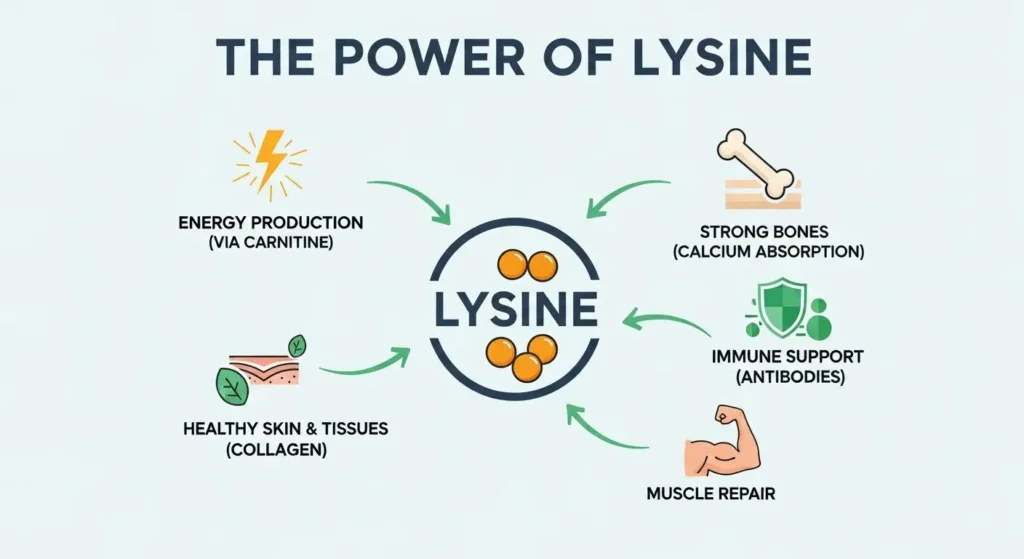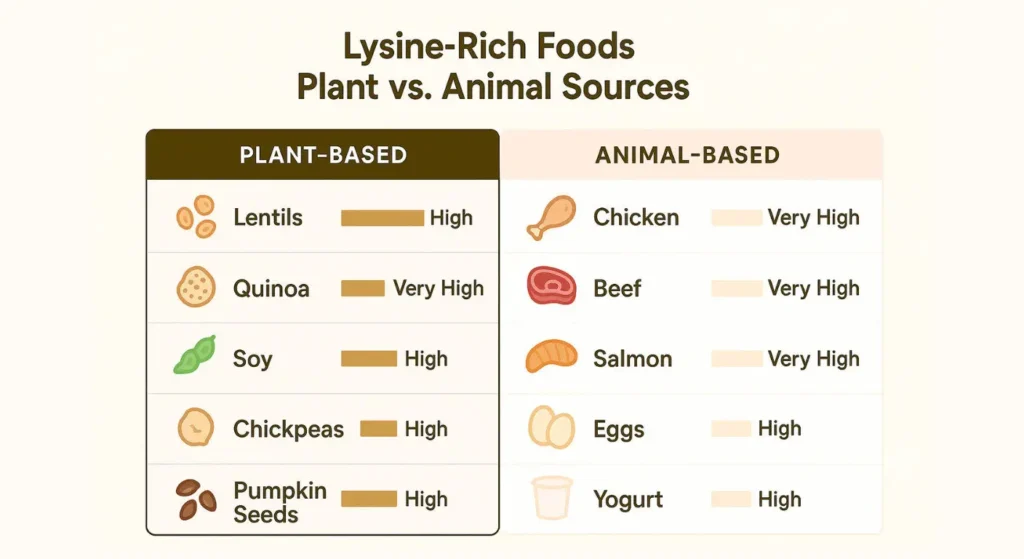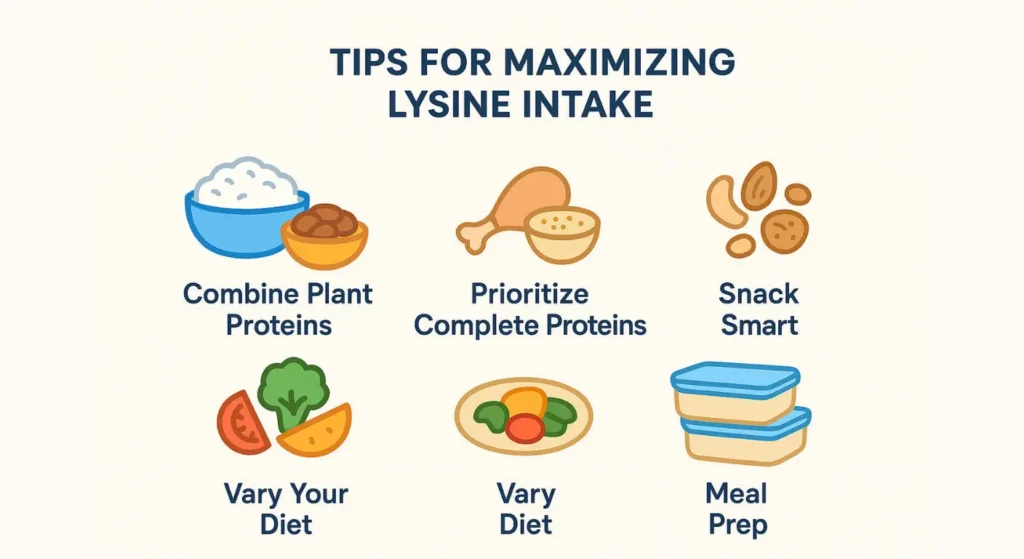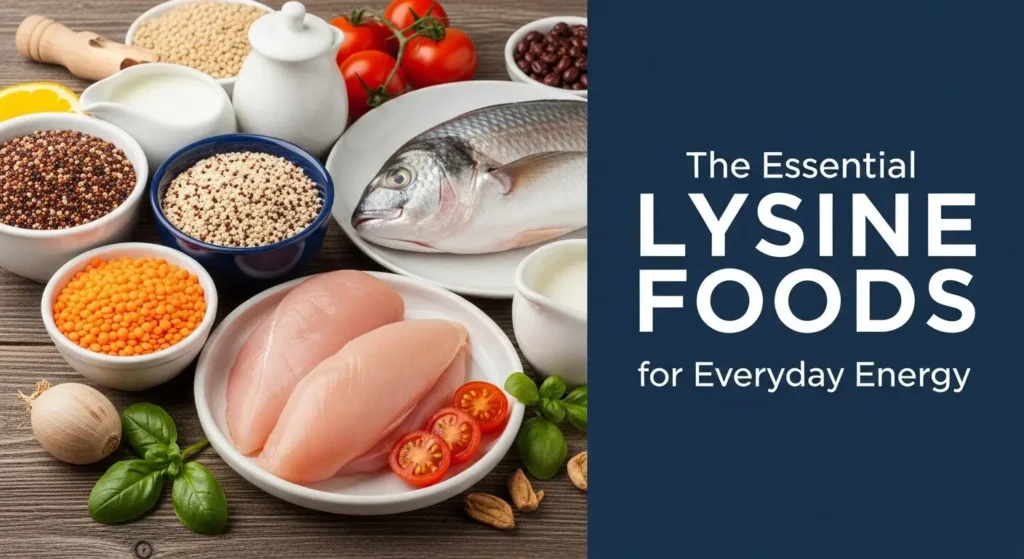Feeling a bit sluggish lately? Do you often find yourself reaching for that afternoon coffee, hoping for a boost? What if the secret to feeling more energized wasn't in a caffeine kick, but in the lysine foods you eat every day? It turns out, a tiny but mighty nutrient called lysine plays a huge role in keeping your body running smoothly and your energy levels high.
Lysine is an “essential” amino acid, which means your body can't make it on its own. You must get it from your diet through lysine foods. Think of it like a crucial building block that your body needs for many important jobs, from growing new tissues to helping your immune system fight off sickness. And yes, it's a key player in how energetic you feel!
In this guide, we're going to explore the wonderful world of lysine foods. We'll show you exactly what lysine is, why it's so important for your energy, and most importantly, where to find it in your daily meals. Get ready to discover how simple dietary changes can make a big difference in how you feel, giving you that natural, sustained energy you've been looking for!
Key Takeaways
- Lysine is an Essential Amino Acid: Your body cannot produce lysine, so you must get it through the foods you eat. It's vital for many bodily functions.
- Boosts Energy and Reduces Fatigue: Lysine food helps your body create carnitine, a nutrient that turns fat into energy, which is key for fighting tiredness and boosting stamina.
- Supports Muscle and Bone Health: This important amino acid is crucial for repairing tissues, building muscle, and helping your body absorb calcium, leading to stronger bones.
- Immune System and Stress Relief: Lysine aids in creating antibodies, hormones, and enzymes, all of which strengthen your immune system and may help manage stress and anxiety.
- Found in Many Foods: You can easily get enough lysine from a balanced diet including lean meats, fish, dairy, eggs, legumes, nuts, and certain grains like quinoa.
What Exactly Is Lysine Foods and Why Is It So Important?
Let's break down what lysine is in simple terms. Imagine your body is a complex machine, and proteins are the tiny gears and levers that make everything work. Proteins, in turn, are built from even smaller units called amino acids. There are 20 different amino acids that your body uses to build all the proteins it needs.
Out of these 20, nine are called “essential amino acids.” Lysine is one of them. “Essential” doesn't just mean “important”; it means your body cannot make it from other substances. You absolutely have to get lysine from the food you eat. If you don't consume enough lysine foods, your body won't have all the building blocks it needs, and certain functions can start to slow down or not work as well.
The Many Roles of Lysine in Your Body
Lysine isn't a one-trick pony; it's involved in a wide range of vital processes that keep you healthy and full of life.
- Protein Production: As mentioned, lysine is a fundamental building block for all proteins in your body. This includes proteins for muscles, enzymes, hormones, and antibodies.
- Collagen Formation: Collagen is like the glue that holds your body together. It's super important for healthy skin, bones, tendons, and cartilage. Lysine plays a direct role in making collagen, helping keep your skin firm and your joints strong.
- Calcium Absorption: Lysine helps your body absorb calcium, which is critical for strong bones and teeth. It also helps reduce the amount of calcium lost in your urine, meaning more calcium stays in your body where it's needed.
- Carnitine Production: This is where the “energy” part comes in big time! Lysine is a precursor to L-carnitine, a nutrient that helps your body turn fatty acids into energy. If you're low on lysine, you might not produce enough carnitine, leading to feelings of fatigue and low energy.
- Immune System Support: Lysine helps your body create antibodies, which are the specialized proteins that fight off viruses and bacteria. A healthy immune system means you're less likely to get sick.
- Wound Healing: Because of its role in collagen formation and tissue repair, lysine is important for healing cuts, scrapes, and other injuries.
As you can see, lysine is far more than just a simple nutrient. It's a powerhouse that supports everything from your bones and muscles to your energy levels and ability to fight off illness. Making sure you get enough lysine foods in your diet is a smart move for your overall health and well-being.

Why Lysine Foods is Your Go-To for Everyday Energy
Now that we know what lysine does, let's zoom in on its direct impact on your energy levels. If you've been feeling unusually tired, even after a good night's sleep, a lack of lysine might be playing a role.
The Carnitine Connection: Fueling Your Body
The most direct link between lysine and energy is through its role in creating L-carnitine. Think of L-carnitine as a tiny shuttle that transports fatty acids into the “power plants” of your cells, called mitochondria. Once inside, these fatty acids are burned to produce energy.
- No Lysine, No Carnitine: If you don't have enough lysine (and another amino acid called methionine), your body can't make enough L-carnitine.
- No Carnitine, No Fuel Transport: Without enough L-carnitine, those fatty acids can't get into the mitochondria efficiently.
- No Fuel Transport, Low Energy: This means your body can't convert fat into energy as effectively, leading to feelings of fatigue, weakness, and a general lack of stamina.
So, by making sure you get enough lysine foods, you're essentially ensuring your body has the raw materials to produce the carnitine it needs to keep your energy production system running at full throttle. It's like making sure your car has enough oil to keep the engine lubricated and powerful!
Beyond Carnitine: Muscle Repair and Stress Reduction
While carnitine is a big part of the energy story, lysine contributes in other ways too:
- Muscle Repair and Growth: When you exercise, your muscle fibers get tiny tears. Lysine is crucial for repairing these tissues and building new muscle mass. Strong, healthy muscles use energy more efficiently and contribute to overall vitality. If your muscles aren't recovering well, you'll feel tired and sore.
- Stress and Anxiety Reduction: Some research suggests that lysine might help reduce anxiety and stress. Chronic stress can be a huge drain on your energy. By potentially helping to calm the nervous system, lysine might indirectly boost your energy by reducing the energy-sapping effects of stress. Imagine feeling less worried and therefore having more mental energy for your daily tasks.
- Improved Nutrient Absorption: By aiding in calcium absorption, lysine ensures your bones are strong, which supports an active lifestyle. Good bone health means you can move more freely and stay active without discomfort, contributing to your overall energy and well-being.
So, if you're looking for a natural way to boost your energy, improve your physical performance, and even feel a bit calmer, focusing on lysine foods is an excellent strategy. It's a foundational nutrient that supports your body's energy factory from multiple angles.
Top Plant-Based Lysine Foods
For those following vegetarian, vegan, or simply plant-rich diets, getting enough lysine is absolutely achievable! Many delicious plant-based foods are packed with this essential amino acid. Let's explore some of the best lysine foods from the plant kingdom.
Legumes: The Powerhouses of Plant Protein
Legumes are truly superstars when it comes to plant-based protein and lysine. They are versatile, affordable, and incredibly nutritious.
- Lentils: These small but mighty legumes are a fantastic source of lysine. A single cup of cooked lentils can provide a significant amount. They're great in soups, stews, salads, or as a side dish.
- How to enjoy: Lentil soup, curried lentils, lentil patties, or added to pasta sauces.
- Chickpeas (Garbanzo Beans): Another excellent choice! Chickpeas are not only rich in lysine but also in fiber, which helps keep you feeling full and your digestion healthy.
- How to enjoy: Hummus, roasted chickpeas for a snack, in salads, or as a base for vegetarian curries.
- Black Beans: A staple in many cuisines, black beans are a good source of lysine, fiber, and various minerals.
- How to enjoy: Black bean burgers, tacos, burritos, or in a hearty chili.
- Kidney Beans: Similar to black beans, kidney beans offer a solid dose of lysine and are perfect for adding bulk and nutrition to meals.
- How to enjoy: Chili con carne (or vegetarian chili), salads, or bean spreads.
- Soybeans (Edamame, Tofu, Tempeh): Soy products are complete proteins, meaning they contain all nine essential amino acids, including lysine.
- Edamame: Young soybeans, often served in the pod, are a delicious snack.
- Tofu: Made from condensed soy milk, tofu is incredibly versatile and absorbs flavors well.
- Tempeh: A fermented soybean product, tempeh has a firmer texture and nutty flavor.
- How to enjoy: Stir-fries, grilled tofu/tempeh, edamame as a snack or in salads.
Grains and Seeds: Surprising Sources
While many grains are lower in lysine, some stand out as excellent sources, especially when combined with other plant foods.
- Quinoa: Often called a “superfood,” quinoa is one of the few plant foods that is a complete protein, making it an exceptional source of lysine. It's also gluten-free.
- How to enjoy: As a side dish instead of rice, in salads, breakfast bowls, or as a base for vegetarian burgers.
- Buckwheat: Despite its name, buckwheat is not related to wheat and is gluten-free. It's another complete protein with good lysine content.
- How to enjoy: Buckwheat groats (kasha), soba noodles, or buckwheat flour for pancakes.
- Pistachios: These tasty nuts offer a decent amount of lysine, along with healthy fats and fiber.
- How to enjoy: As a snack, in salads, or as a topping for yogurt.
- Cashews: Another nut with a good lysine profile, cashews are also great for texture and flavor.
- How to enjoy: As a snack, in stir-fries, or blended into creamy sauces.
- Pumpkin Seeds: These seeds are not only rich in lysine but also in zinc and magnesium.
- How to enjoy: Roasted as a snack, sprinkled on salads, or added to granola.
Combining Plant Foods for Maximum Lysine
To ensure you're getting all essential amino acids, including lysine, on a plant-based diet, it's often recommended to combine different plant protein sources throughout the day. For example:
- Grains + Legumes: Rice and beans, or whole-wheat bread with hummus.
- Nuts/Seeds + Legumes: A lentil salad with pumpkin seeds.
This strategy, known as “protein complementing,” helps ensure you get a full spectrum of amino acids. However, many plant-based foods, like quinoa and soy, are already complete proteins on their own.
By thoughtfully including a variety of these plant-based lysine foods in your diet, you can easily meet your daily needs and keep your energy levels soaring!
Top Animal-Based Lysine Foods
For those who include animal products in their diet, getting enough lysine is generally straightforward, as many animal proteins are excellent, complete sources of this essential amino acid. These foods are often considered the most efficient ways to obtain lysine.
Lean Meats and Poultry: Protein Powerhouses
- Chicken and Turkey: Especially the breast meat, chicken and turkey are lean, versatile sources of high-quality protein and lysine. They are staples in many healthy diets.
- How to enjoy: Grilled chicken salad, turkey sandwiches, roasted chicken with vegetables, or in stir-fries.
- Beef: Red meat, particularly lean cuts, is another fantastic source of lysine, as well as iron and B vitamins, which are also crucial for energy.
- How to enjoy: Lean steak, ground beef in chili or tacos, or in stews.
- Pork: Lean cuts of pork, like pork loin, also provide a good amount of lysine.
- How to enjoy: Pork tenderloin, lean pork chops, or roasted pork.
Fish and Seafood: Ocean's Bounty of Lysine
Fish and seafood are not only packed with lysine but also often provide beneficial omega-3 fatty acids, which are great for heart and brain health.
- Cod: A white fish that is lean and a good source of lysine.
- How to enjoy: Baked cod, fish tacos, or in fish stews.
- Sardines: These small, oily fish are surprisingly rich in lysine, calcium, and omega-3s.
- How to enjoy: On crackers, in salads, or as a topping for toast.
- Tuna: Canned or fresh, tuna is a convenient and excellent source of lysine.
- How to enjoy: Tuna salad sandwiches, grilled tuna steaks, or in pasta dishes.
- Salmon: Known for its healthy fats, salmon is also a superb source of lysine and other essential nutrients.
- How to enjoy: Baked salmon, grilled salmon, or smoked salmon in salads.
- Shrimp: A low-calorie, high-protein option that provides a good amount of lysine.
- How to enjoy: Shrimp scampi, shrimp stir-fry, or in salads.
Dairy and Eggs: Everyday Lysine Boosters
Dairy products and eggs are easy to incorporate into almost any diet and are reliable sources of lysine.
- Milk: A glass of milk provides a decent amount of lysine, along with calcium and vitamin D.
- How to enjoy: As a beverage, in smoothies, or with cereal.
- Yogurt: Especially Greek yogurt, which is strained to remove whey, resulting in a higher protein and lysine content.
- How to enjoy: With fruit and granola, in smoothies, or as a base for dips.
- Cheese: Most types of cheese, from cheddar to parmesan, are good sources of lysine.
- How to enjoy: On sandwiches, grated over pasta, or as a snack.
- Eggs: Often called nature's perfect food, eggs are a complete protein and an excellent source of lysine, along with many other vitamins and minerals.
- How to enjoy: Scrambled, fried, poached, in omelets, or hard-boiled as a snack.
Incorporating Animal-Based Lysine Foods
Including a variety of these animal-based lysine foods in your meals throughout the week can help ensure you meet your daily lysine requirements effortlessly. They are not only rich in this essential amino acid but also provide other crucial nutrients that support overall health and sustained energy. Remember to choose lean cuts and prepare them in healthy ways (baking, grilling, broiling) to maximize their benefits.

How Much Lysine Do You Need?
So, you know lysine is important and where to find it. But how much do you actually need each day to feel your best and keep your energy up?
The exact amount can vary slightly depending on your age, weight, activity level, and overall health. However, generally, adults need about 30 mg of lysine per kilogram of body weight per day.
Let's do a quick example: If you weigh 70 kilograms (about 154 pounds), you would need approximately: 70 kg * 30 mg/kg = 2,100 mg (or 2.1 grams) of lysine per day.
This might sound like a lot, but as we've seen, many common foods are excellent sources. For example, a 3-ounce serving of chicken breast can provide around 2,000 mg of lysine, almost meeting the daily need for an average adult! A cup of cooked lentils provides about 1,200 mg.
Factors That Might Increase Your Need
Certain situations might slightly increase your body's demand for lysine:
- High Activity Levels: Athletes or people with very active lifestyles might benefit from a bit more lysine to support muscle repair and energy production.
- Healing from Injuries: Because lysine is crucial for collagen formation and tissue repair, your needs might go up if you're recovering from surgery or an injury.
- Stress: Periods of high stress can sometimes deplete nutrients, and ensuring adequate lysine intake might be beneficial.
- Vegetarian/Vegan Diets: While plant-based diets can provide enough lysine, it's important for vegetarians and vegans to be mindful of incorporating a variety of lysine-rich plant foods, as some plant proteins might be lower in lysine compared to animal proteins.
“Eating a variety of whole foods is usually the best way to ensure you're getting all the essential amino acids, including lysine. Think diversity on your plate!” – Nutrition Expert Quote
What Happens If You Don't Get Enough?
A deficiency in lysine is rare in people who eat a varied diet, especially those who consume animal products. However, if you consistently don't get enough lysine, you might experience:
- Fatigue and Low Energy: The most noticeable symptom, due to impaired carnitine production.
- Nausea and Dizziness: General feelings of being unwell.
- Loss of Appetite: Reduced desire to eat.
- Anemia: Lysine helps with iron absorption, so a deficiency could impact red blood cell production.
- Slowed Growth: Especially in children, due to its role in protein synthesis.
- Weakened Immune System: Making you more prone to infections.
The good news is that by simply being aware of which foods are rich in lysine and making an effort to include them in your daily meals, you can easily avoid these issues and keep your energy levels optimized.
Lysine and Special Diets: Vegetarian and Vegan Considerations
For those following vegetarian or vegan diets, getting enough of all essential amino acids, including lysine, requires a little more attention. While it's absolutely possible to thrive on these diets, it's good to know which plant-based lysine foods are your best friends.
The Challenge and the Solution
The main challenge for vegetarians and vegans is that most plant proteins are not “complete proteins” on their own. This means they might be low in one or more essential amino acids. For many grains, fruits, and vegetables, lysine is often the limiting amino acid.
However, this doesn't mean plant-based diets are deficient! The solution is simple: eat a variety of plant-based protein sources throughout the day. Your body is smart and can combine amino acids from different foods eaten over several hours.
Key Plant-Based Lysine Sources Revisited
As we discussed earlier, here are the top plant-based sources that should be staples for vegetarians and vegans:
- Legumes: Lentils, chickpeas, black beans, kidney beans, and other beans are incredibly rich in lysine. Make them a cornerstone of your meals.
- Soy Products: Tofu, tempeh, edamame, and soy milk are complete proteins and excellent sources of lysine.
- Quinoa: This ancient grain is a complete protein, making it an easy win for lysine intake.
- Buckwheat: Another complete protein, great for variety.
- Nuts and Seeds: Pistachios, cashews, and pumpkin seeds offer good amounts of lysine.
- Seitan: Made from wheat gluten, seitan is a high-protein, lysine-rich meat substitute.
- Spirulina: This blue-green algae is a surprisingly complete protein source.
Sample Meal Ideas for Lysine-Rich Plant-Based Diets
Here are some ideas to help you combine foods for optimal lysine intake:
- Breakfast: Quinoa porridge with nuts and seeds, or a smoothie with soy milk and a scoop of plant-based protein powder.
- Lunch: A large salad with chickpeas, lentils, and a sprinkle of pumpkin seeds. Or a hearty lentil soup with whole-grain bread.
- Dinner: Tofu or tempeh stir-fry with a variety of vegetables and brown rice. Black bean burgers on a whole-wheat bun.
- Snacks: Edamame, a handful of pistachios, or hummus with veggie sticks.
By focusing on these nutrient-dense plant-based lysine foods and ensuring variety, vegetarians and vegans can easily meet their lysine needs and enjoy all the energy-boosting benefits this essential amino acid offers.
Lysine Supplements: When Are They Necessary?
While the primary focus of this article is on obtaining lysine through food, it's worth briefly touching on supplements. For most healthy individuals who eat a balanced and varied diet, lysine supplements are generally not necessary. You can easily get enough lysine from your daily lysine foods.
However, there might be specific situations where a supplement could be considered:
- Confirmed Deficiency: If a doctor or registered dietitian determines you have a lysine deficiency that cannot be adequately addressed through diet alone. This is rare but possible, especially in cases of severe malnutrition or certain medical conditions.
- Specific Health Conditions: Lysine is sometimes used in higher doses for certain health purposes, such as managing herpes simplex virus outbreaks (cold sores). In these cases, supplementation is usually guided by a healthcare professional.
- Strict Dietary Restrictions: In very rare instances where an individual has extremely limited food choices due to allergies or other severe dietary restrictions, and cannot consume enough lysine-rich foods.
Important Considerations if you're thinking about supplements:
- Consult a Professional: Always talk to your doctor or a registered dietitian before starting any new supplement, including lysine. They can help determine if it's appropriate for you and advise on the correct dosage.
- Quality Matters: If you do take a supplement, choose a reputable brand that undergoes third-party testing to ensure purity and potency.
- Food First: Remember, whole foods provide a complex array of nutrients that work together, offering benefits that supplements often cannot fully replicate. Prioritize lysine foods as your main source.
For those interested in maintaining overall health, including prostate health, while considering supplements, it's good to be informed. You can learn more about the most effective prostate supplements reviewed for 2025 or explore a guide to prostate supplements for understanding and making your choice. For specific natural solutions, you might look into Prostavive as a natural solution for prostate health or how Prostavive tackles prostate problems head-on. Additionally, for those interested in weight management and overall well-being, you can check out Liv Pure reviews to know what to expect when you try it.
The bottom line: For daily energy and general health, focusing on a varied diet rich in lysine foods is almost always the best and most natural approach. Supplements should be a secondary consideration, used under professional guidance.

Tips for Maximizing Your Lysine Intake for Peak Energy
Now that you're a lysine expert, let's put it all into practice! Here are some actionable tips to help you easily incorporate more lysine foods into your daily diet and keep that energy flowing.
1. Plan Your Meals with Protein in Mind
- Start with Protein: When planning breakfast, lunch, and dinner, think about your protein source first. Choose from the list of lysine-rich foods we've covered.
- Balance Your Plate: Aim for a protein source at every meal. This helps ensure a steady supply of amino acids throughout the day.
- Breakfast: Eggs, Greek yogurt, or a quinoa breakfast bowl.
- Lunch: Lentil soup, chicken salad, or a black bean burger.
- Dinner: Baked salmon, tofu stir-fry, or lean beef with roasted vegetables.
2. Embrace Legumes and Grains
- Make Them Staples: Lentils, chickpeas, and beans are versatile and affordable. Add them to soups, salads, stews, and side dishes.
- Discover Quinoa and Buckwheat: These complete proteins are fantastic alternatives to rice or pasta. Use them as a base for bowls or in salads.
3. Smart Snacking
- Protein-Packed Snacks: Instead of reaching for sugary snacks that give you a quick spike and then a crash, opt for lysine-rich options.
- Hard-boiled eggs
- A handful of nuts (pistachios, cashews) or seeds (pumpkin seeds)
- Greek yogurt
- Edamame (steamed or roasted)
- Hummus with veggie sticks
4. Vary Your Protein Sources
- Don't Stick to Just One: While chicken is great, don't eat it every single day. Rotate through different protein sources to ensure you get a wide range of nutrients.
- Monday: Chicken
- Tuesday: Lentils
- Wednesday: Salmon
- Thursday: Tofu
- Friday: Beef
- Saturday: Eggs
- Sunday: Chickpea curry
5. Combine Plant Proteins (Especially for Vegans/Vegetarians)
- The Power of Pairing: If you're plant-based, remember to combine different plant proteins to get all essential amino acids.
- Rice and beans
- Peanut butter on whole-wheat bread
- Hummus with pita bread
- Corn and beans in a salsa or salad
6. Meal Prep for Success
- Cook in Batches: Cook larger quantities of lysine-rich foods like quinoa, lentils, chicken, or roasted chickpeas at the beginning of the week. This makes it easy to assemble quick, nutritious meals and snacks when you're busy.
- Portion Control: Portion out your meals into containers so you have grab-and-go options throughout the week.
7. Hydrate Adequately
- Water is Key: While not directly a lysine food, staying well-hydrated is crucial for energy and overall bodily functions, including nutrient transport and metabolism. Don't forget your water!
By following these simple tips, you'll be well on your way to optimizing your lysine intake, boosting your body's natural energy production, and feeling more vibrant and active every day!
Common Questions About Lysine and Energy
It's natural to have questions when you're learning about an important nutrient like lysine. Here are some of the most common ones people ask:
Q1: Can too much lysine be harmful?
A: For most healthy people, consuming lysine through food is very safe and unlikely to cause harm. Your body naturally regulates its amino acid levels. However, very high doses from supplements (much higher than you'd get from food) could potentially lead to mild side effects like stomach upset, nausea, or diarrhea in some individuals. Always stick to recommended dosages if using supplements and consult a doctor.
Q2: Is lysine good for athletes?
A: Yes! Lysine is very beneficial for athletes. It plays a crucial role in:
- Muscle repair and growth: Essential for recovery after intense workouts.
- Collagen formation: Important for healthy joints, tendons, and ligaments, reducing injury risk.
- Carnitine production: Helps convert fat into energy, supporting endurance and stamina. Athletes often have higher protein needs, and ensuring adequate lysine intake is part of meeting those needs.
Q3: Does cooking destroy lysine in foods?
A: While some nutrients can be lost during cooking, lysine is relatively stable. Standard cooking methods like boiling, baking, or grilling will not significantly destroy the lysine content in foods. However, very prolonged cooking at extremely high temperatures might cause some minimal loss, but not enough to make the food a poor source. The benefits of cooking (like making food digestible and safe) far outweigh any minor nutrient loss.
Q4: Can children get enough lysine from their diet?
A: Yes, typically children who eat a balanced diet with protein sources like milk, eggs, meat, fish, or a variety of legumes and grains will get enough lysine for healthy growth and development. Lysine is particularly important for growing children due to its role in protein synthesis and bone health.
Q5: How quickly can I feel the energy benefits of increasing lysine foods?
A: You likely won't feel an immediate “jolt” like caffeine. The benefits of optimizing nutrient intake, including lysine, tend to be more gradual and sustained. As your body consistently receives adequate lysine, its ability to produce carnitine and support other energy-related processes improves. You might notice a reduction in fatigue, improved stamina, and overall better well-being over several weeks or months of consistent intake. It's about building a stronger, more efficient body from the inside out!
Q6: Are there any foods that block lysine absorption?
A: There isn't significant evidence that common foods directly “block” lysine absorption in a harmful way. However, a diet very high in another amino acid called arginine might theoretically compete with lysine for absorption in very specific circumstances (like managing herpes outbreaks, where the goal is to reduce arginine's effects). For general dietary purposes and energy, this is not a concern; focus on a balanced intake of various protein sources.
By understanding these common questions, you can feel more confident in making informed choices about your diet and harnessing the power of lysine foods for better energy and health!
Conclusion: Power Up Your Plate with Lysine Foods!
We've journeyed through the fascinating world of lysine, uncovering its vital roles in everything from building strong muscles and bones to supercharging your energy levels. It's clear that this essential amino acid isn't just another nutrient; it's a fundamental building block for a healthy, energetic life.
Remember, the beauty of lysine is that it's readily available in a wide array of delicious and common foods. Whether you prefer lean meats, fish, dairy, or you're rocking a plant-based diet, there are abundant lysine foods ready to fuel your day.
By making a conscious effort to include these lysine-rich options in your meals and snacks, you're not just eating well; you're actively supporting your body's natural energy production, boosting your immune system, and contributing to overall vitality. Say goodbye to that afternoon slump and hello to sustained energy and a feeling of well-being!
So, go ahead – experiment with new recipes, rediscover old favorites, and fill your plate with the power of lysine. Your body (and your energy levels!) will thank you for it. Here's to a more energized, vibrant you!







